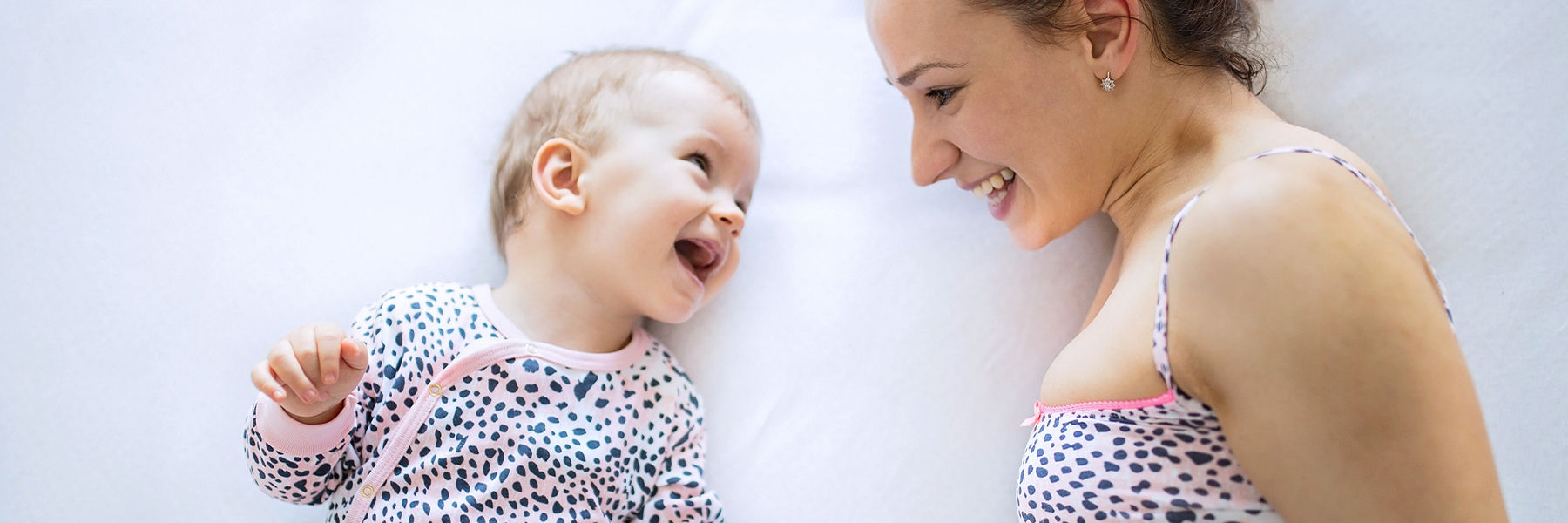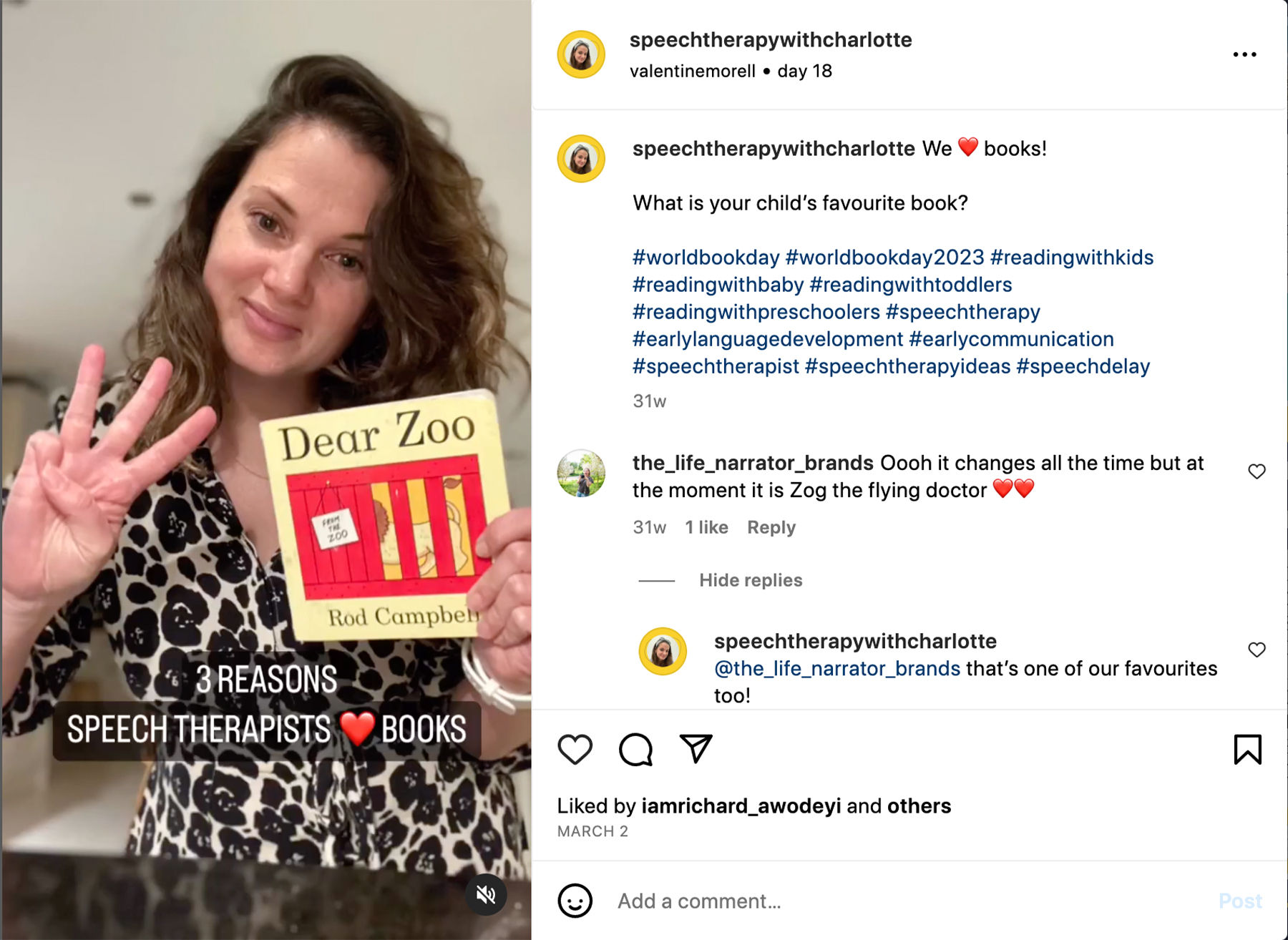Use arrow keys to navigate through the menu items. Use Tab key to navigate through the menu banners.
Teach Your Baby To Talk

Teach Your Baby To Talk
Discover how to encourage your baby’s first words with these practical tips
Between 6 and 12 months, your baby’s speech and language skills are rapidly developing.
‘Babies are starting to understand what you say, and making different sounds through babbling,’ says Speech and Language Therapist Charlotte Hall (@speechtherapywithcharlotte). ‘Some babies may even say their first recognisable words around their first birthday.’
To help your baby learn to communicate, encouragement is key. ‘Your reinforcement means everything right now!’ Charlotte says.
Respond to babbling
Babbling is when your baby starts to experiment with sounds. Your baby’s babbles will evolve from single syllables such as ‘baa’ or ‘daa’ to repeated sounds like ‘ba-ba-ba’ and then to varied sounds such as ‘ma-ga-ga’. At around 10 months, babbling becomes more like a conversation with pauses and turn-taking.
Babbling may sound like adorable nonsense, but it’s essential for your child’s language development and is the precursor to talking. By responding to your baby’s babbles, you’ll encourage them to babble more, as this amazing experiment from the BBC reveals.
‘Talking or babbling in response to your baby’s babbles is an early form of conversation,’ says Charlotte. ‘It shows babies that the sounds they make are important, and it helps them link your words with the shapes your mouth makes.’
Tune into your baby’s interests
Another great way to strengthen your baby’s language learning is through “joint attention”. This means paying attention to the little things your baby is interested in and talking about those things.
Perhaps you notice that your baby is looking at some birds. Say to your baby: ‘You can see the birds. They’re flying away!’ Or perhaps you notice that your baby is holding their teddy. Say, ‘That’s your teddy. He’s soft and furry, isn’t he?’
These shared moments will help your baby connect words with meanings and help both of you build an even closer bond.
Here are some other ways to boost your baby’s language at this exciting stage.
-
Keep it short and sweet
Talking to your baby in short, simple sentences will help them understand what you are saying. It will also make it easier for them to copy your words when they’re ready. -
Read to your baby
Books are brilliant for speech and language development because words and phrases are repeated often, which supports vocabulary learning. ‘Reading also creates moments of connection and communication starts with connection,’ says Charlotte.
-
Name and point
The NHS suggests pointing at things you can both see, for example, saying, ‘Look, a cat’. This helps your baby learn words and, in time, they'll start to copy you. As your baby gets older, add more detail, such as, ‘Look, a black cat’. -
Sing songs
Nursery rhymes are catchy, repetitive and recognisable and a great way for babies to learn language skills. Make them fun by including actions as you sing. Tiny Happy People ambassadors, Jess Shears and Dom Lever, met on Love Island and now have 2 young children. ‘Singing is where we definitely found our feet. We can’t sing, but babies like it, so that’s alright!’ -
Play games
Try speaking games such as “Round and round the garden” or pretend to talk to your baby using a banana as a phone! These games teach your baby important skills like taking turns, paying attention, and listening, which are all part of speech and communication. -
Your turn, their turn
When you’re chatting to your baby, allow time within interactions for them to take a turn. ‘Try making a comment and then pausing to see how your child responds,’ says Charlotte. -
Ditch the dummy
It’s harder for your baby to talk with a dummy in. The NHS advises keeping dummy use for sleep time only and says, ‘Aim to stop using dummies completely by 12 months.’ -
Remove distractions
Charlotte recommends setting aside 5-10 minutes a day to have a good quality interaction with your child. ‘Put your phone away, turn off the TV, and focus on connecting with them.’
Your baby’s first words
Hearing your baby’s first real words is a thrilling milestone that you may never forget! But what are they most likely to say?
According to this survey of 1,000 parents, the most common first words in the UK are ‘da-da’ or ‘ma-ma’, followed by ‘no’, ‘ball’, ‘bye’, ‘cat’ and ‘doggy’.
‘While some babies may say their first words at 12 months, remember that babies are all different and develop skills at different rates,’ says Charlotte. ‘Some babies don’t say their first words until they are 16 to 18 months old.’
Of course, if you’re concerned about your baby’s speech, flag any concerns to your health visitor, GP or childcare setting. They’ll be able to provide tips, advice and a plan to best support your baby’s development moving forwards.
Help & Customer service
- Help Centre
- How to shop
- Product recalls
Payment Methodslist with 8 items
- Asda Group of Companies
- Modern Slavery Statement
- Electrical Waste Recycling
- Terms & Conditions
- Customer Review Policy
- Privacy Centre
- Cookie Settings
- Accessibility
© ASDA 2025
